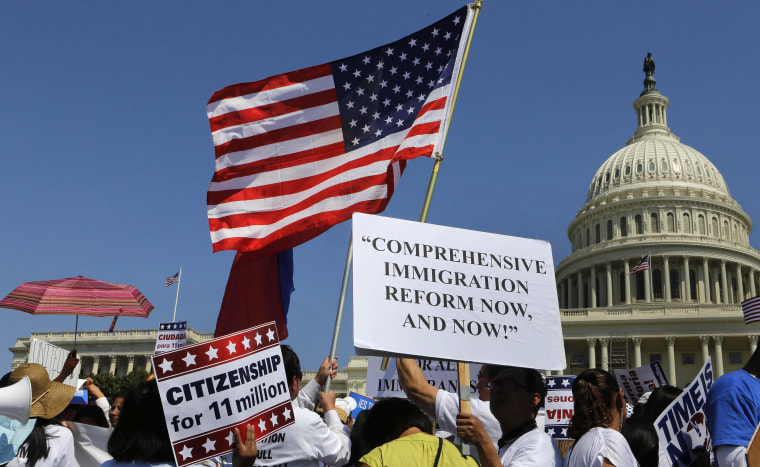As an educator at a predominantly Latino charter school in Los Angeles, Nayeli Reyes, 29, has a unique view into the issues in her students’ lives.
“These kids have been through so much, like the loss of a parent, witnessing gang violence, and it can be very humbling to hear their stories,” Reyes said. Immigration status is a recurring, unavoidable theme in her students’ lives, explained Reyes, because it can affect everything from whether they can afford college to keeping their family intact. “Our top priority is helping our kids succeed,” she said, “but that is so often connected with immigration.”
Yet while that is the reality for millions of Latinos, there are many millions more whose lives are not directly touched by immigration issues in their family. This has led to a larger discussion among scholars and policy experts about whether immigration is crowding out other issues facing the Latino community.
In a recent commentary, National Institute for Latino Policy President Angelo Falcón wrote, “Although immigration reform affects about 15 percent of the total Latino population, as a public policy issue it now occupies almost all the Latino policy agenda, sucking up, as one colleague recently put it, all the oxygen on Latino issues.”
Falcón questions whether the continued debate about the status of the undocumented population is a distraction from the needs of the much larger pool of Hispanics who are citizens. The Pew Research Hispanic Trends Project estimates that there are 11.7 undocumented migrants in the U.S. By comparison, the U.S. Census Bureau reports that the overall U.S. Hispanic population is 53 million.
"We have to get to the point where we can walk and chew gum at the same time, and focus on other things like discrimination, education, and the infrastructures in our communities,” said Falcón.
“I don’t want to minimize the immigration issue,” Falcón said. “But we need to strike a better balance. It (immigration) is stifling the Latino agenda for the 21st century. We have to get to the point where we can walk and chew gum at the same time, and focus on other things like discrimination, education, and the infrastructures in our communities.”
Stella Rouse, assistant professor in government and politics at the University of Maryland, agrees with Falcón – in part. “I think immigration is having that crowding out effect now and has had that effect for years,” she said. Rouse, author of the book Latinos in the Legislative Process, said that the lack of national Latino leaders makes it harder for the community to organize around other issues. But although immigration is the issue most associated with Latinos, she pointed out, it is not necessarily the most interesting issue to Latinos. “Most Latinos would probably love not to have to deal with it.”
In December 2013, Pew Research reported that the top three issues among Hispanics were education, jobs and the economy, and healthcare. Immigration ranked fifth, after the federal government debt.
“Immigration reform gets a lot of attention because it is important and because it is unfinished,” said Matt Barreto, associate professor of political science at the University of Washington. A co-founder of the research firm Latino Decisions, Barreto stated that there is “no evidence” that Latinos are overlooking other issues. “At the national level, these issues are just not addressed at the same level of salience.”
Barreto stated that there is “no evidence” that Latinos are overlooking other issues. “At the national level, these issues are just not addressed at the same level of salience.”
Immigration can also be viewed as an issue that is often thrust upon the Latino community. “Immigration continues to be wielded as a wedge issue,” said Clarissa Martinez De Castro of the National Council of La Raza (NCLR), the nation's largest Hispanic advocacy organization.
“When we are talking about health care or voting rights, there are those who keep inserting immigration into the mix, whether it pertains to a particular issue or not – and normally in a detrimental way,” said Martinez De Castro. Along with its work on immigration reform, she noted, NCLR is involved with a wide range of issues at both the national and grass-roots level.
Several experts mentioned that the national media has a role in emphasizing immigration over other topics as well. “The mainstream tends to reduce our diversity down to one issue,” said Cristina Beltrán, associate professor at New York University. “It also has the tendency to treat us all as perpetual immigrants.”
“Immigration should be one step in understanding the Latino community,” added Beltrán, author of the book The Trouble With Unity. “Instead it has become the end-all.”
One by-product of the drawn out immigration debate is a "savvy" and more politicized young Latino electorate, said Beltrán.
Still, Beltrán sees one significant by-product of the drawn-out immigration debate. “We now have a younger generation who has become politicized. They are savvy, skeptical, and optimistic all at the same time. I think this will have long-term consequences, because they have a sense of their own power.”
This “immigration generation” will someday turn their energy and focus to other issues, argues Beltrán. “These young people are participating in civil disobedience and so much activism in their 20s,” she said. “Imagine what they are going to be doing in their 40s – with law degrees!”
In the meantime, Falcón hopes that young activists and advocacy organizations will not hesitate to press forward on issues besides immigration. “It is not a question of either/or,” he said, “It is more about restoring balance to how we look at our issues. We (Latinos) should not only think about assimilating – but also about how the culture will accommodate us. We should not be afraid of becoming a movement that challenges society.”
